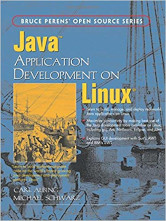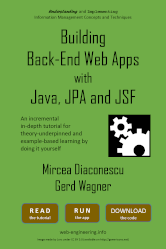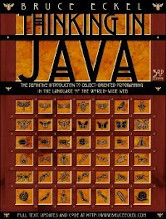Last Updated on September 19, 2024
4. Java Application Development on Linux by Carl Albing, Michael Schwarz
 Java Application Development on Linux is a hands-on guide to the full Java application development life-cycle on Linux.
Java Application Development on Linux is a hands-on guide to the full Java application development life-cycle on Linux.
This book leads readers through business-logic object analysis, database design, Java servlet UIs, Java Server Pages (JSP) UIs, Swing GUIs, and Standard Widget Toolkit (SWT) GUIs. Scaling up to the enterprise level provides the opportunity to use both the JBoss Application Server and the Apache Geronimo Application Servers, and Enterprise JavaBeans (EJB).
Java Application Development on Linux is targeted at experienced Java programmers who are looking to develop and deploy Java applications on Linux systems.
Learn how to:
- Use development tools available on Linux, such as the GNU Compiler for Java (gcj), Ant, the
- NetBeans IDE, IBM’s Eclipse Java IDE, JUnit, and SunONE Studio
- Develop business logic layers using Java DataBase Connectivity (JDBC)
- Storing the Data with Oracle, PostgreSQL and MySQL
- Introduction to JDBC
- Add a Web interface using servlets and JSPs
- Add a GUI using Sun’s Abstract Window Toolkit (AWT) and IBM’s SWT Toolkit
- Servlets
- JSP: Servlets including how to write a JSP application
- Deploy EJBs in Linux
This book is part of Bruce Perens’ Open Source Series. All books in this series are released under the Open Publication License, v1.0 or later.
5. Building Back-End Web Apps with Java, JPA and JSF by Mircea Diaconescu, Gerd Wagner
 Building Back-End Web Apps with Java, JPA and JSF teaches you how to build Java back-end web applications with Java Server Faces (JSF) as the user interface technology, the Java Persistence API (JPA) for object-to-storage mapping, and a MySQL database.
Building Back-End Web Apps with Java, JPA and JSF teaches you how to build Java back-end web applications with Java Server Faces (JSF) as the user interface technology, the Java Persistence API (JPA) for object-to-storage mapping, and a MySQL database.
It follows a “learning by doing” approach, focusing only on the essential parts of Java and the minimum needed for starting to code your first application. The book shows the reader how to build a minimal Java web app in just 7 steps: set up the folder structure, write the model code, configure the app, implement the Create Use Case, implement the Retrieve/List All Use Case, implement the update Use Case, and implement the Delete Use Case. There are practice projects included.
The book is in draft, and may be incomplete in some respects.
The book, along with any associated source code, is licensed under The Code Project Open License (CPOL).
6. Thinking in Java, 3rd ed. Revision 2.0 by Bruce Eckel

Thinking in Java, 3rd Edition covers many of the nooks and crannies of the Java language, which is of great value in the programming world.
The most prominent feature of the book is its extremely thorough treatment of the Java language, with special attention to object design. Some of the best thinking about objects is in this book, including when to use composition over inheritance. The esoteric details of Java in regard to defining classes are thoroughly laid out.
Topics covered:
- Object-design basics – an introduction to the basic concepts of OOP, including an overview of development methods
- Inheritance and polymorphism – Polymorphism allows improved code organization and readability as well as the creation of extensible programs that can be “grown” not only during the original creation of the project but also when new features are desired
- Object lifetimes – Java provides a feature called a garbage collector that automatically discovers when an object is no longer in use and destroys it
- Error Handling with exception handling – dealing with errors
- Analysis and design basics
- Java basics: keywords and flow control
- Initializing objects
- Garbage collection – automatically releases memory resources when they are no longer being used
- Java packages
- Designing for reuse: composition vs. inheritance
- Interfaces and inner classes
- Arrays and container classes – includes the defining and initializing an array, returning an array, the Arrays class, filling an array, copying an array, comparing arrays, array element comparisons, sorting an array, searching a sorted array, and array summary
- Java I/O classes – gives the reader an introduction to the variety of I/O classes in the standard Java library and how to use them
- Concurrency – objects provide a way to divide a program into independent sections
- Run-time type identification
- Network programming with sockets
- Cloning objects – looks at basic threads, sharing limited resources, thread states, cooperation between threads, deadlock and more
- Creating Windows and Applets – covers the Java 2 Swing library
- The Java Native Interface (JNI)
- Java programming guidelines – contains suggestions to help guide the reader in performing low-level program design, and in writing code
Next page: Page 3 – Java Programming for Kids and more books
Pages in this article:
Page 1 – Introduction to Programming Using Java and more books
Page 2 – Java Application Development on Linux and more books
Page 3 – Java Programming for Kids and more books
Page 4 – Object Oriented Programming using Java and more books
Page 5 – Java Structures and more books
All books in this series:
| Free Programming Books | |
|---|---|
| Ada | ALGOL-like programming language, extended from Pascal and other languages |
| Agda | Dependently typed functional language based on intuitionistic Type Theory |
| Arduino | Inexpensive, flexible, open source microcontroller platform |
| Assembly | As close to writing machine code without writing in pure hexadecimal |
| Awk | Versatile language designed for pattern scanning and processing language |
| Bash | Shell and command language; popular both as a shell and a scripting language |
| BASIC | Beginner’s All-purpose Symbolic Instruction Code |
| C | General-purpose, procedural, portable, high-level language |
| C++ | General-purpose, portable, free-form, multi-paradigm language |
| C# | Combines the power and flexibility of C++ with the simplicity of Visual Basic |
| Clojure | Dialect of the Lisp programming language |
| ClojureScript | Compiler for Clojure that targets JavaScript |
| COBOL | Common Business-Oriented Language |
| CoffeeScript | Transcompiles into JavaScript inspired by Ruby, Python and Haskell |
| Coq | Dependently typed language similar to Agda, Idris, F* and others |
| Crystal | General-purpose, concurrent, multi-paradigm, object-oriented language |
| CSS | CSS (Cascading Style Sheets) specifies a web page’s appearance |
| D | General-purpose systems programming language with a C-like syntax |
| Dart | Client-optimized language for fast apps on multiple platforms |
| Dylan | Multi-paradigm language supporting functional and object-oriented coding |
| ECMAScript | Best known as the language embedded in web browsers |
| Eiffel | Object-oriented language designed by Bertrand Meyer |
| Elixir | Relatively new functional language running on the Erlang virtual machine |
| Erlang | General-purpose, concurrent, declarative, functional language |
| F# | Uses functional, imperative, and object-oriented programming methods |
| Factor | Dynamic stack-based programming language |
| Forth | Imperative stack-based programming language |
| Fortran | The first high-level language, using the first compiler |
| Go | Compiled, statically typed programming language |
| Groovy | Powerful, optionally typed and dynamic language |
| Haskell | Standardized, general-purpose, polymorphically, statically typed language |
| HTML | HyperText Markup Language |
| Icon | Wide variety of features for processing and presenting symbolic data |
| J | Array programming language based primarily on APL |
| Java | General-purpose, concurrent, class-based, object-oriented, high-level language |
| JavaScript | Interpreted, prototype-based, scripting language |
| Julia | High-level, high-performance language for technical computing |
| Kotlin | More modern version of Java |
| LabVIEW | Designed to enable domain experts to build power systems quickly |
| LaTeX | Professional document preparation system and document markup language |
| Lisp | Unique features - excellent to study programming constructs |
| Logo | Dialect of Lisp that features interactivity, modularity, extensibility |
| Lua | Designed as an embeddable scripting language |
| Markdown | Plain text formatting syntax designed to be easy-to-read and easy-to-write |
| Objective-C | Object-oriented language that adds Smalltalk-style messaging to C |
| OCaml | The main implementation of the Caml language |
| Pascal | Imperative and procedural language designed in the late 1960s |
| Perl | High-level, general-purpose, interpreted, scripting, dynamic language |
| PHP | PHP has been at the helm of the web for many years |
| PostScript | Interpreted, stack-based and Turing complete language |
| Prolog | A general purpose, declarative, logic programming language |
| PureScript | Small strongly, statically typed language compiling to JavaScript |
| Python | General-purpose, structured, powerful language |
| QML | Hierarchical declarative language for user interface layout - JSON-like syntax |
| R | De facto standard among statisticians and data analysts |
| Racket | General-purpose, object-oriented, multi-paradigm, functional language |
| Raku | Member of the Perl family of programming languages |
| Ruby | General purpose, scripting, structured, flexible, fully object-oriented language |
| Rust | Ideal for systems, embedded, and other performance critical code |
| Scala | Modern, object-functional, multi-paradigm, Java-based language |
| Scheme | A general-purpose, functional language descended from Lisp and Algol |
| Scratch | Visual programming language designed for 8-16 year-old children |
| SQL | Access and manipulate data held in a relational database management system |
| Standard ML | General-purpose functional language characterized as "Lisp with types" |
| Swift | Powerful and intuitive general-purpose programming language |
| Tcl | Dynamic language based on concepts of Lisp, C, and Unix shells |
| TeX | Markup and programming language - create professional quality typeset text |
| TypeScript | Strict syntactical superset of JavaScript adding optional static typing |
| Vala | Object-oriented language, syntactically similar to C# |
| VHDL | Hardware description language used in electronic design automation |
| VimL | Powerful scripting language of the Vim editor |
| XML | Rules for defining semantic tags describing structure ad meaning |
